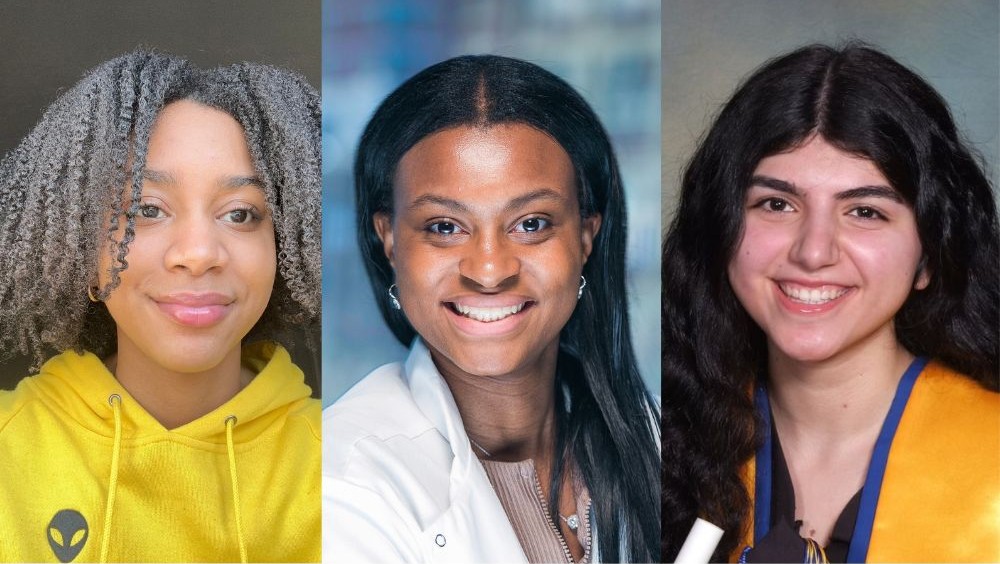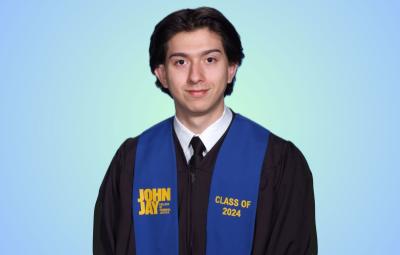
Research is pivotal to John Jay's mission of educating for justice, empowering our students to become change agents for a more just and positive society. Each year, talented students—mentored by a dedicated group of faculty and staff—delve into complex issues and uncover new insights through intense research projects. This work is presented at the annual Research & Creativity Expo, which is among the “largest, most comprehensive and inclusive student showcases within CUNY,” says Bettina Muenster, Assistant Director, Office for Student Research & Creativity. “Students have an opportunity to showcase their interdisciplinary projects in a variety of formats. Their work is acknowledged by their peers and faculty mentors and celebrated by leadership.” In total, 480 students, mentored by 120 faculty, will present their works from May 1 to May 10. Below are some inspiring examples of this year’s presenters.

Ava Nabatkhoran ’24
Major: Political Science
Minor: Law
Hometown: Queens, NY
Programs: Macaulay Honors College, Honors Program, Pre-Law Institute
Mentors: Professor Peter Romaniuk, Ph.D., Professor Jennifer Rutledge, Ph.D.
Career Aspiration: Litigator and Clinical Law Professor
Project Title: Making Sense of Laws Affecting Voting Rights
My research centered on changes in voting rights laws in Georgia and New York over the past 20 years. I examined why these bills were passed and how they can go against some general trends. I was drawn to this research topic after a political science course with Professor Peter Romaniuk and interning at the Brennan Center for Justice. I conducted a qualitative case study using laws passed from January 2002 to January 2024 and examined pieces of legislation, press releases, and news coverage to answer my central research questions of why some states restricted the right to vote and others have expanded it. The right to vote is so sacred, so understanding these suppressive efforts—explicitly created against expansive efforts to increase voter turnout—is a vital undertaking for protecting our democratic institutions. I hope this project reminds people how important the right to vote is.

Lisa Haye ’25
Major: Economics
Minor: Computer Science
Hometown: Bronx, NY
Program: Office of Student Research and Creativity (OSRC)
Mentors: OSRC Assistant Director Bettina Muenster, Professor David Munns, Ph.D.
Career Aspiration: Research Analyst
Project Title: Revealing Eugenics’ Impact on Economic Policies
My project blends economics with historical studies to investigate the influence of eugenics on economics and policies. It was important to connect how eugenics had shaped economics—the distribution of resources and wealth—to illustrate how dangerous these biases can be when left unchecked—especially when people of color, women, and social minorities face the brunt of eugenic ideologies. What makes eugenics so dangerous is the consensus that there is a social hierarchy that differentiates certain humans as worthy or inferior to justify harmful policies for “the greater good.” Eugenics didn’t fall with Nazi Germany, it continues today. It impacts multiple fields, including medicine, public health, and the law. We vilify the poor and associate certain negative traits with racial and social minorities. If we don’t check eugenic biases, we further push policies that perpetuate socioeconomic inequities. I want people to walk away from my project with the bravery to assess how far their perceptions of the world are influenced by what they’ve been socialized to believe.

Patricia St. Fleur ’25
Major: Cell and Molecular Biology
Minor: Music
Hometown: Brooklyn, NY
Programs: Honors Program, PRISM, OSRC, McNair Program, CUNY Inclusive Economy Initiative, FEMMS
Mentors: Professor Shu-Yuan Cheng, Ph.D., Professor Daryl Wout, Ph.D., Yuk-Ting Lau, Ph.D., Sam Baruch, Ph.D., Professor Ana Pego, Ph.D.
Career Aspiration: Physician
Project Title: Toxic Link Between Fungicide & Neurodegenerative Diseases
My research focused on deepening the understanding of the toxic potential effects of mancozeb—a wide-spectrum fungicide used in food crops—on DNA content and cell proliferation in PC12 cells. Often used in neurotoxicity and neurodegeneration studies, PC12 cells synthesize, store, and release norepinephrine and dopamine. Given concerns about how mancozeb can potentially cause environmental contamination and—through exposure via contaminated food and occasional contact—may lead to neurodegenerative diseases like Alzheimer’s and Parkinson’s, I aimed to discover mancozeb’s impact on human health by interpreting its toxicity on cell growth. Throughout the project, I observed the significant impact mancozeb had on the cell cycle regulation in PC12 cells. Looking at it from an environmental and occupational justice lens, in the U.S., about 90 percent of pesticides used is in the agricultural sector. This means that agricultural laborers and their families—the majority of whom are Latinx—are especially vulnerable to the effects of mancozeb.


